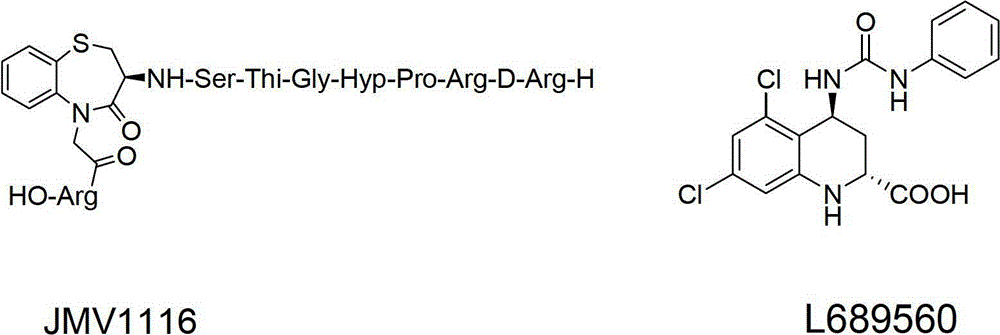Preparation method of N-(5-methoxycarbonyl-2-hydroxyphenyl) amino acid ester compounds
A technology of ester compounds and hydroxyphenyl, which is applied in the field of preparing N-amino acid ester compounds, can solve the problems of harsh reaction conditions, high reaction temperature, complex catalytic system, etc., and achieves no need for noble metal catalysis, mild reaction conditions and sustainable development. The effect of preparation
- Summary
- Abstract
- Description
- Claims
- Application Information
AI Technical Summary
Problems solved by technology
Method used
Image
Examples
Embodiment 1
[0031] The preparation of N-(5-methoxycarbonyl-2-hydroxyl phenyl)-L-alanine methyl ester comprises the following steps:
[0032]Get 3-dehydroshikimate methyl ester (0.93g, 5.0mmol), anhydrous aluminum trichloride (0.03g, 0.25mmol), 10g3A molecular sieves in reaction flask, the ethanol solution of 20mlL-alanine methyl ester ( 0.77g, 5.5mmol L-alanine methyl ester hydrochloride and 0.30g, 5.5mmol sodium methoxide in ethanol) were added to the above reaction flask. The above reaction system was reacted at 70° C. for 6 h, followed by TLC. After completion of the reaction, cool, filter, and remove the solvent by rotary evaporation, column chromatography, eluting with ethyl acetate-petroleum ether, and concentrating to remove the solvent to obtain a light yellow oily liquid (([α] 25 / D =-63.79, c=0.59 dehydrated alcohol) 1.03g, yield: 82%.
[0033] The structural characterization data of the product are as follows: 1 HNMR (400MHz, DMSO-d 6 )δppm: 10.40(s,1H),7.19(dd,J 1 =8.15,J ...
Embodiment 2
[0035] The preparation of N-(5-methoxycarbonyl-2-hydroxyl phenyl) glycine methyl ester comprises the following steps:
[0036] Get 3-dehydroshikimate methyl ester (0.93g, 5.0mmol), p-toluenesulfonic acid (0.05g, 0.25mmol), 10g3A molecular sieves in reaction flask, the methanol solution of 20ml glycine methyl ester (0.69g, 5.5mmol Glycine methyl ester hydrochloride and 0.30 g, 5.5 mmol of sodium methoxide in methanol) were added to the above reaction flask. The above reaction system was reacted at 65° C. for 12 h, followed by TLC. After the reaction was completed, it was cooled, filtered, and the solvent was removed by rotary evaporation. Column chromatography, eluting with ethyl acetate-petroleum ether, recrystallized to obtain 0.99 g of a light yellow solid, yield: 83%. m.p.110-112°C.
[0037] The structural characterization data of the product are as follows: 1 HNMR (400MHz, DMSO-d 6 )δppm: 10.36(s,1H),7.18(dd,J 1 =8.00,J 2 =1.74Hz,1H),6.89(d,J=1.74Hz,1H),6.75(d,J=8.00...
Embodiment 3
[0039] The preparation of N-(5-methoxycarbonyl-2-hydroxyl phenyl)-L-isoleucine methyl ester comprises the following steps:
[0040] Take 3-dehydroshikimate methyl ester (0.93g, 5.0mmol), acetic acid (14.30μl, 0.25mmol), 10g3A molecular sieves in a reaction flask, and 20ml of L-isoleucine methyl ester ethanol solution (1.00g, 5.5mmol L-isoleucine methyl ester hydrochloride and 0.30g, 5.5mmol sodium methoxide in ethanol) were added to the above reaction flask. The above reaction system was reacted at 70° C. for 6 h, followed by TLC. After the reaction was completed, it was cooled, filtered, and the solvent was removed by rotary evaporation, and column chromatography was eluted with ethyl acetate-petroleum ether, and recrystallized to obtain a light yellow solid (([α] 25 / D =-83.80, c=0.28 absolute ethanol) 1.18g, yield: 80%. m.p.109-111°C.
[0041] The structural characterization data of the product are as follows: 1 HNMR (400MHz, DMSO-d 6 )δppm: 10.47(s,1H),7.19(dd,J 1 =8....
PUM
 Login to View More
Login to View More Abstract
Description
Claims
Application Information
 Login to View More
Login to View More - R&D
- Intellectual Property
- Life Sciences
- Materials
- Tech Scout
- Unparalleled Data Quality
- Higher Quality Content
- 60% Fewer Hallucinations
Browse by: Latest US Patents, China's latest patents, Technical Efficacy Thesaurus, Application Domain, Technology Topic, Popular Technical Reports.
© 2025 PatSnap. All rights reserved.Legal|Privacy policy|Modern Slavery Act Transparency Statement|Sitemap|About US| Contact US: help@patsnap.com



